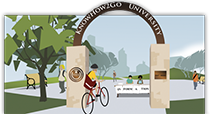Talk to an Adult
Planning for college isn't something you do by yourself - it's really a team effort. But it's up to you to put together your team. And that means talking to the adults in your life who can help - from your parent, guardian or other family member to your teacher, school counselor, coach or religious leader.
Get the conversation started!
Your Parents
The best way to communicate with parents, or any adult, is to keep talking to them no matter what. Strong relationships really depend on keeping the lines of communication open. Here are some ways to approach your parents (or any adult) with a specific topic:
Plan What to Say
Think over what you want to say in advance, and write down the two or three most important points you want to make.
Be Direct
Let them know directly that there's something you'd like to discuss. Be sure you have their full attention and be direct in your language. Say, "There's something important I want to talk to you about" instead of "Hey, when you have a moment I'd like to talk."
Pick a Good Time to Talk
Try to approach them at a time when you know they'll be less busy and more able to focus on you. You may even want to ask if they could talk at a particular time so that you know you have their attention.
Write it Down First
Some people find it easier to put their ideas into a letter or e-mail. Let the other person read it and then have your discussion.
Disagree without Disrespect
Parents are only human, and they can feel offended when their views are challenged. Using respectful language and behavior is important. Resist the temptation to use sarcasm, yell or put down your parents and you'll have a much better chance of getting what you want.
Your School Counselor
Your school counselor, or guidance counselor, is one of your best resources as you plan for college. Take the first step and make an appointment to discuss a plan for college. He or she has information about admission tests, college preparation and your education and career options.
Here are some basic questions to help get you started:
- Do you have any information to help me start exploring my interests and related careers?
- What are the required and recommended courses - for graduation and for college prep?
- How should I plan my schedule so I'll complete them?
- Do you have any after-school or evening sessions available for college planning?
- Do you have college handbooks or other guides I can browse or borrow?
- What activities can I do at home and over the summer to get ready for college?
- What kind of grades do different colleges require?
- Where do other kids from this school attend college?
- What are the requirements or standards for the honor society?
Your Teachers
OK, so it may be hard to think of your teachers as real people. But they eat pizza, watch movies and enjoy sports on the weekends just like you. And they know about more than just their subject matter. Given the chance, they can offer you the kind of advice and support that might change your life forever. Here's how to build a connection:
Show Some Interest
Obviously, your teachers are really interested in their subjects. Showing the teacher that you care, even if you're not a math whiz or fluent in French, sends the message that you are a dedicated student.
Schedule a Conference
Schedule a private conference during a teacher's free period to get extra help, ask questions, inquire about a career in the subject or talk about your progress in class. You may be surprised to learn that your teacher is a bit more relaxed one-on-one than when lecturing in front of the whole class.
Be Yourself
Teachers can sense when your only motivation for trying to be a "favorite student" is to get special treatment or a good grade. Just be yourself and forget about trying to show off.
Deal with Study Problems
If you find a subject difficult, talk to your teacher right away about extra tutoring. If you find it boring, talk to your teacher about ways to see the subject in a different light. For example, you may hate math, but learning how to calculate averages and percentages can help you in everything from sports to leaving a tip.
Show Some Respect
Just as teachers need to be fair and treat everyone equally, students have responsibilities too. You don't have to like your teacher or agree with what he or she says, but it is necessary to be polite.
Other Adults
No matter how good your relationship is with your parent or guardian, there will be times when you'll feel more comfortable confiding in other adults. Even if you'd rather talk to friends about certain things, an adult may have more experience, be able to contact the right person or find the best resources to get help.
Ask for Their Word
Most adults will keep your conversations confidential if you ask them to, unless they fear that your health or well-being may be in danger.
Other Adults
Other adults who may be able to help include teachers, your school counselor or other family members such as an aunt, uncle or older sibling. Parents of a close friend may also be able to help.
Spiritual Leaders
If you're involved in a church group or belong to a synagogue or mosque, your spiritual or youth group leader may also be a good source of advice.
Extracurricular Leaders
If you're involved in an extracurricular activity, such as sports or drama, you may feel close enough to your coach or advisor to ask him or her about more personal stuff.





